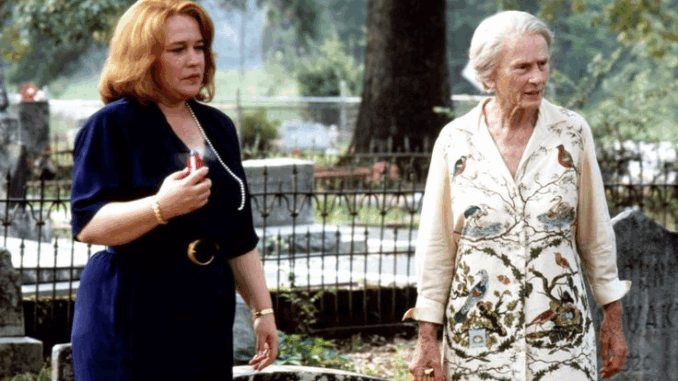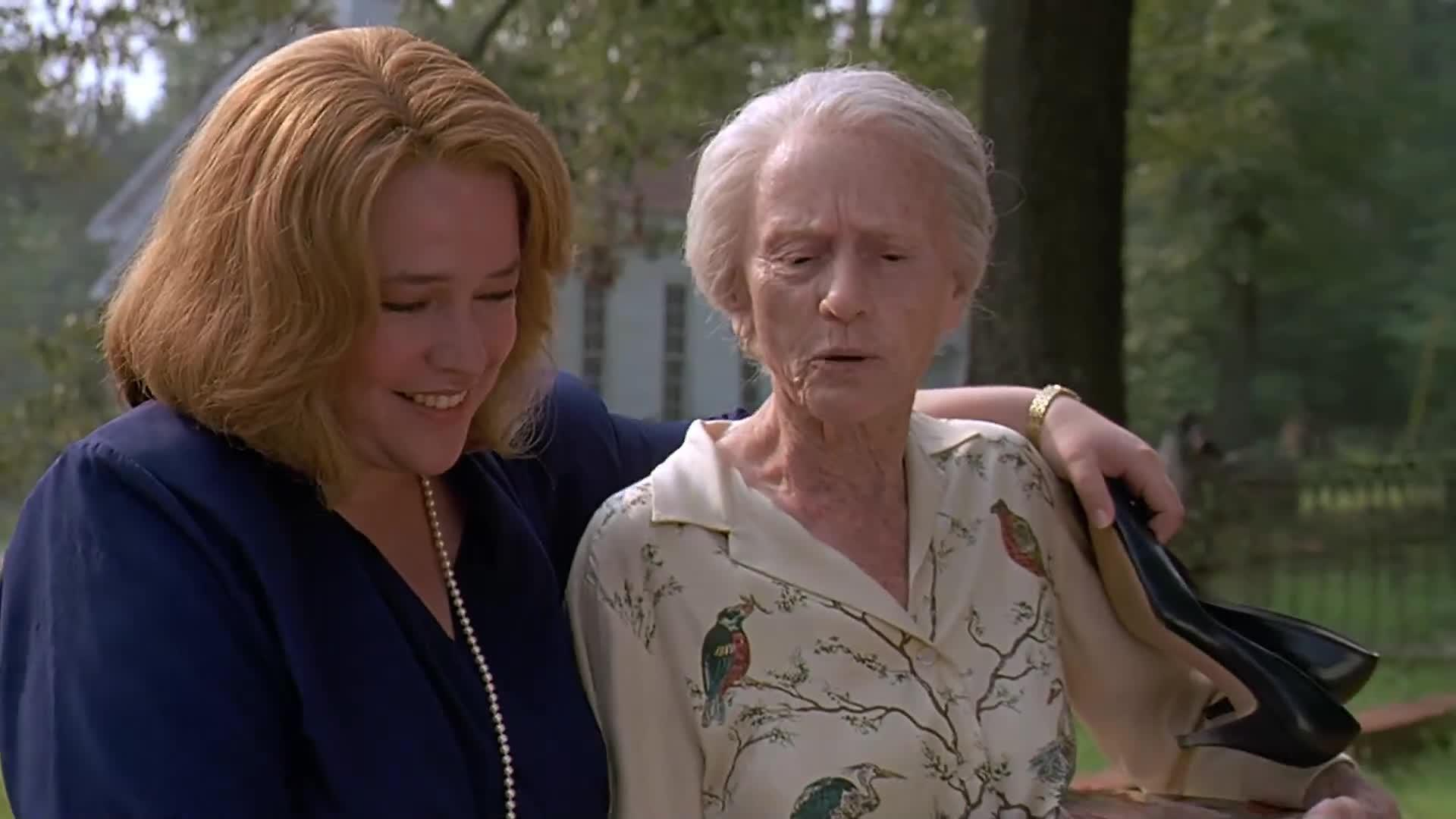
The Power of Storytelling and Identity
Throughout Fried Green Tomatoes, Ninny Threadgoode serves as more than just a narrator—she is the emotional heartbeat of the film’s present-day timeline. From the first moment Evelyn Couch meets her in the Rose Hills Nursing Home, Ninny brings the past alive with stories of Whistle Stop, Alabama, and the fierce, unforgettable women who shaped it.
Her tales are vibrant, full of passion, pain, humor, and quiet rebellion. But as the film nears its end, a subtle yet seismic question emerges: who is Ninny, really? Could she actually be Idgie Threadgoode herself, hiding behind another name? The film never answers this question directly, but it plants enough seeds for the audience to wonder—and to feel the full emotional weight of that ambiguity.
This moment, where fact and fiction blur, becomes one of the most haunting and beautiful in the entire film.
The Clues in the Stories
As Ninny recounts the lives of Idgie and Ruth, it becomes clear that she knows them intimately. She doesn’t speak of them from a distance, like someone who heard these stories secondhand. She talks about Idgie’s wild youth, Buddy’s death, Ruth’s suffering, the café, and even the darker secret about Frank Bennett’s disappearance with astonishing clarity and emotion.
In one particularly telling moment, Evelyn asks Ninny, “So what ever happened to Idgie?” Ninny responds with a smile and a glimmer in her eye: “Oh honey, she’s around… probably out back fishing or up in a tree somewhere.”
It’s not just nostalgia. It’s deeply personal. As if she isn’t talking about Idgie, but as her.
And when Evelyn visits Whistle Stop at the end and finds Ruth’s grave—next to one for Idgie—it raises even more questions. Could it be that Ninny, having lived a life where women had to hide their love and truths, simply took on another name as the years passed?
A Life Lived in the Margins

If Ninny is Idgie, her choice to obscure her identity is not random—it’s a product of survival. In the deeply conservative American South of the early to mid-20th century, women who didn’t conform were pushed to the margins. For a woman like Idgie—fiercely independent, potentially queer, and openly resistant to societal norms—blending in may have been her only way to grow old safely.
By taking on the name Ninny, Idgie might have created a persona that allowed her to exist within the boundaries of society while keeping her truth tucked safely within her stories. It’s possible she found freedom in storytelling, letting the real Idgie live on not in documents or gravestones, but in the hearts of those who heard her tales.
The film allows for this interpretation without confirming it. That choice—leaving the question unanswered—gives power to the audience to decide, and adds depth to Ninny’s entire presence.
Evelyn’s Emotional Anchor
Regardless of her identity, Ninny’s impact on Evelyn is undeniable. She becomes a surrogate grandmother, a mentor, and a guide. Through Ninny’s stories, Evelyn undergoes one of the most profound transformations in the film—from a timid, ignored housewife to a woman with purpose, confidence, and voice.
Ninny doesn’t push Evelyn. She doesn’t offer advice in the conventional sense. Instead, she offers examples—bold, wild, compassionate women who broke rules and made their own homes in the world. It is through these stories that Evelyn begins to see a different possibility for her own life.
If Ninny is Idgie, then her storytelling becomes even more profound—because it is a deeply personal confession wrapped in metaphor. It’s her way of giving her life meaning, passing on her truth in a world that never gave her the space to speak it outright.
Death, Legacy, and the Unseen Truth
At the end of the film, Evelyn returns to the nursing home only to find Ninny gone. The nurse tells her that Ninny’s room is empty, and Evelyn assumes the worst—that Ninny has passed. But instead, she finds a note leading her to Ruth and Idgie’s resting place.
There, on a quiet country road, Evelyn encounters something extraordinary: a fresh jar of honey with honeycomb, accompanied by a note signed, “Love, the Bee Charmer.” It’s a reference to Idgie’s youthful adventures and her deep connection to nature. Evelyn’s eyes widen, her heart swells, and the film lets the possibility hang in the air: Idgie is alive, and Ninny was her all along.
Even in her final act, Ninny/Idgie refuses to confirm her identity. She simply leaves Evelyn with love, memory, and proof that the past still breathes.
This moment is layered with emotion. It’s a farewell, a passing of the torch, and an invitation to keep telling the story. The jar of honey is more than a token—it is a symbol of life continuing beyond the grave, of resilience and sweetness preserved through time.
Why the Ambiguity Matters
Some viewers have criticized the film for not definitively revealing Ninny’s identity. But in truth, the ambiguity is what gives the scene its power. The mystery invites viewers to engage with the story on a deeper level. Was she Idgie? Was she simply someone who loved Idgie dearly? Does it matter?
By leaving the question open, the film respects the nature of memory and storytelling. Sometimes the truth is in the telling, not in the facts. Sometimes a story is more real than a birth certificate or a headstone.
Ninny—whether Idgie or not—embodies the idea that the stories we tell shape who we are. Her truth lives not in what she says, but in what she inspires.
A Final Reflection on Chosen Identity
In a world where marginalized people are often erased from official records—queer women, domestic workers, non-conformists—Fried Green Tomatoes gives us a heroine who may have chosen her name, her identity, and her legacy on her own terms. That, in itself, is a radical act.
If Ninny is Idgie, she has survived longer than anyone expected, loved more deeply than the world allowed, and found peace in passing her stories forward. If she isn’t Idgie, then she is someone who has carried those stories so close to her heart that they’ve become a part of her.
Either way, she is unforgettable.
